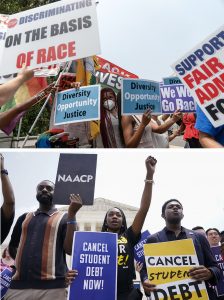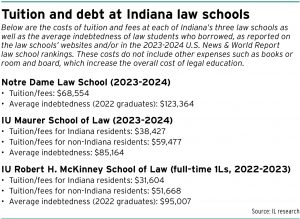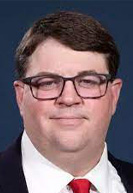Subscriber Benefit
As a subscriber you can listen to articles at work, in the car, or while you work out. Subscribe NowIn two of the most significant decisions of its most recent term, the U.S. Supreme Court last month issued opinions ending affirmative action as it’s been known for 45 years and tossing the Biden administration’s plan to forgive billions of dollars in student loan debt.
The rulings weren’t necessarily surprising to many given the court’s 6-3 conservative majority. Indeed, the court’s liberal justices were in the minority in both cases.
Now, Indiana law school leaders and students are trying to determine how the high court’s rulings will impact the future of legal education, both in terms of diversity and finances.
Indiana Lawyer spoke with law school stakeholders to get their takes on what the SCOTUS decisions mean for them.
____________________________________________________________________________________

The U.S. Supreme Court struck down President Joe Biden’s proposed $400 billion student loan debt relief plan last month, citing the need for Congress to be on board for a federal initiative with such a significant price tag.
The plan, which claimed its authority through the Higher Education Relief Opportunities for Students Act of 2003, would have canceled $10,000 in student loan debt for those making less than $125,000 or households with less than $250,000 in income. Pell Grant recipients, who typically have more financial need, would have had an additional $10,000 in debt forgiven.
The plan would have impacted 40 million Americans with student loan debt obligations.
Six states challenged the plan, arguing that it exceeded the secretary of education’s statutory authority and that the HEROES Act did not authorize the loan cancellation.
A majority of the high court agreed in Biden, President of the United States, et al. v. Nebraska, et al., 22-506, reversing the District Court for the Eastern District of Missouri’s judgment, remanding for further proceedings and denying an application to vacate the 8th Circuit Court of Appeals’ injunction as moot.
The court’s majority opinion was written by Chief Justice John Roberts, with Justices Clarence Thomas, Samuel Alito, Neil Gorsuch, Brett Kavanaugh and Amy Coney Barrett joining. Barrett also wrote a separate concurring opinion. Justice Elena Kagan wrote a separate dissenting opinion, which Justices Sonia Sotomayor and Ketanji Brown Jackson joined.
“… (A)s we have already shown, the HEROES Act provides no authorization for the Secretary’s plan even when examined using the ordinary tools of statutory interpretation — let alone ‘clear congressional authorization’ for such a program,” Roberts wrote.

However, Kagan disagreed with the majority that the assistance was too “significant.”
“In every respect, the Court today exceeds its proper, limited role in our Nation’s governance,” she wrote.
Indiana University Maurer School of Law professor Steve Sanders said the case is one he will be teaching in his constitutional law classes, but it also applies to administrative law.
“I will probably reference it as a question of constitutional law in the sense that it has to do with the separation of powers between the president in the executive branch and Congress,” Sanders said. “The main place where it will get discussed is administrative law, which deals with, ‘What is the power the federal agencies like the Department of Education have and how do we decide how much running room they have under the law to do things like this?’”
Sanders added that he doesn’t think it’s an unrealistic expectation to say Congress has to be involved in a debt relief plan that is as big as the one proposed by Biden.
“The president implements laws that Congress makes, and this is a big enough deal that we expect Congress to authorize it expressly,” he said.
 Carrying debt
Carrying debt
Indiana University Robert H. McKinney School of Law 2019 graduate Erika Bryant said she always knew she had to pay back her loans, but the thought of financial relief was an enticing one.
She had applied and gotten approved for student loan debt relief under the Biden plan, but she didn’t keep her hopes up that it would ever happen.
“It was exciting to think about the student loan debt relief and even submitting for it and saying, yes, it was approved,” Bryant. “But I wasn’t anticipating the follow through.”
Even though no one has had to continue their payments recently due to the COVID-19 pandemic pause extensions, Bryant said she continued making her payments because there has been zero interest accruing. She is currently looking at $70,400 of student loan debt from undergrad and law school.
“It’s been a blessing to have my interest at zero for so long,” she said.
Repayments are expected to resume in October, with interest on loan debt resuming in September.
When Bryant graduated law school, she took the solo career path, with a practice area in family law. But now she’s looking to make a change.
Specifically, she’s returned to school and is studying mortuary science at the Mid-America College of Funeral Service online.
Alternative avenues?
While the Supreme Court may have struck down Biden’s initial debt relief plan, his administration is exploring other options.
Biden is now looking at a new repayment plan called Saving on a Valuable Education. That plan would save borrowers thousands by keeping their monthly payments low while also preventing high interest rates, according to the Biden administration. That plan is a new form of an income-driven repayment plan that the Department of Education has said will phase out the current Revised Pay As You Earn plan.
Biden is also looking at the Higher Education Act of 1965, which gives the secretary of education some authority to waive or release borrowers’ debt.
Support for SCOTUS

Frank Garrison, an attorney with the Pacific Legal Foundation who is licensed in Indiana, filed a lawsuit in 2022 alleging the student loan debt cancellation plan injured him.
Garrison’s case in the Indiana Southern District Court was dismissed for lack of standing, then was put on hold at the 7th Circuit Court of Appeals pending Supreme Court review.
On July 6, the 7th Circuit dismissed the appeal following the filing of a Notice of Stipulated Dismissal.
Garrison said he thinks the U.S. Supreme Court got it right with its decision in June to strike down Biden’s debt relief plan.
“American people make law through the legislature, and the executive branch created a separation of powers problem,” he said.
He added that the new Biden plan under the Higher Education Act could take years to complete because it requires public comment. That means it won’t be final before the next presidential election.
Also, he opined that if Biden would have initially started with that plan, it would almost be finished at this point.•
Please enable JavaScript to view this content.
